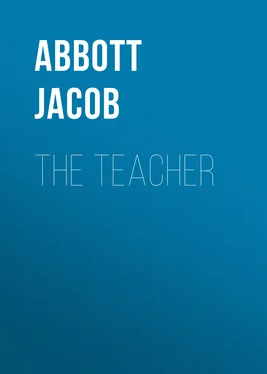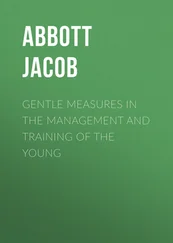Jacob Abbott - The Teacher
Здесь есть возможность читать онлайн «Jacob Abbott - The Teacher» — ознакомительный отрывок электронной книги совершенно бесплатно, а после прочтения отрывка купить полную версию. В некоторых случаях можно слушать аудио, скачать через торрент в формате fb2 и присутствует краткое содержание. Жанр: foreign_edu, pedagogy_book, на английском языке. Описание произведения, (предисловие) а так же отзывы посетителей доступны на портале библиотеки ЛибКат.
- Название:The Teacher
- Автор:
- Жанр:
- Год:неизвестен
- ISBN:нет данных
- Рейтинг книги:5 / 5. Голосов: 1
-
Избранное:Добавить в избранное
- Отзывы:
-
Ваша оценка:
- 100
- 1
- 2
- 3
- 4
- 5
The Teacher: краткое содержание, описание и аннотация
Предлагаем к чтению аннотацию, описание, краткое содержание или предисловие (зависит от того, что написал сам автор книги «The Teacher»). Если вы не нашли необходимую информацию о книге — напишите в комментариях, мы постараемся отыскать её.
The Teacher — читать онлайн ознакомительный отрывок
Ниже представлен текст книги, разбитый по страницам. Система сохранения места последней прочитанной страницы, позволяет с удобством читать онлайн бесплатно книгу «The Teacher», без необходимости каждый раз заново искать на чём Вы остановились. Поставьте закладку, и сможете в любой момент перейти на страницу, на которой закончили чтение.
Интервал:
Закладка:
"Now boys," continued the master, "will you assist me in making arrangements to prevent the recurrence of all temptations of this kind hereafter? It is plain that every boy ought to have a nail appropriated expressly to his use. The first thing to be done is, to ascertain whether there are enough for all. I should like, therefore, to have two committees appointed; one, to count and report the number of nails in the entry, and also how much room there is for more; the other, to ascertain the number of scholars in school. They can count all who are here, and by observing the vacant desks, they can ascertain the number absent. When this investigation is made, I will tell you what to do next."
The boys seemed pleased with the plan, and the committees were appointed, two members on each. The master took care to give the quarrellers some share in the work, apparently forgetting, from this time, the unpleasant occurrence which had brought up the subject.
When the boys came to tell him their results, he asked them to make a little memorandum, in writing, as he might forget, before the time came for reading them. They brought him presently a rough scrap of paper, with the figures marked upon it. He told them he should forget which was the number of nails, and which the number of scholars, unless they wrote it down.
"It is the custom among men," said he, "to make out their report, in such a case, fully, so that it would explain itself; and I should like to have you, if you are willing, to make out yours a little more distinctly."
Accordingly, after a little additional explanation, the boys made another attempt, and presently returned, with something like the following:
The Committee for counting the nails report as follows:

The other report was very similar, though somewhat rudely written and expressed, and both were perfectly satisfactory to the preceptor, as he plainly showed by the manner in which he received them.
I need not finish the description of this case, by narrating, particularly, the reading of the reports, the appointment of a committee to assign the nails, and to paste up the names of the scholars, one to each. The work, in such a case, might be done in recesses, and out of school hours, and though, at first, the teacher will find, that it is as much trouble to accomplish business in this way, as it would be to attend to it directly himself,—yet after a very little experience, he will find that his pupils will acquire dexterity and readiness, and will be able to render him very material assistance in the accomplishment of his plans.
This, however, the assistance rendered to the teacher , is not the object. The main design is to interest the pupils , in the management and the welfare of the school,—to identify them, as it were, with it. It will accomplish this object; and every teacher, who will try the experiment, and carry it into effect, with any tolerable degree of skill, will find that it will, in a short time, change the whole aspect of the school, in regard to the feelings subsisting between himself and his pupils.
Each teacher, who tries such an experiment, will find himself insensibly repeating it, and after a time he may have quite a number of officers and committees, who are entrusted with various departments of business. He will have a secretary, chosen by ballot, by the scholars, to keep a record of all the important transactions in the school, for each day. At first, he will dictate to the secretary, telling him precisely what to say, or even writing it for him, and merely requiring him to copy it into the book provided for the purpose. Afterwards he will give him less and less assistance, till he can keep the record properly himself. The record of each day will be read on the succeeding, at the hour for business. He will have a committee of one or two to take care of the fire, and another to see that the room is constantly in good order. He will have distributors for each division of seats, to distribute books, and compositions, and pens, and to collect votes. And thus, in a short time, his school will become regularly organized, as a society , or legislative assembly . The boys will learn submission to the majority, in such unimportant things as may be committed to them: they will learn system and regularity; and every thing else that belongs to the science of political self government.
There are dangers, however. What useful practice has not its dangers? One of these is, that the teacher will allow these arrangements to take up too much time. He must guard against this. I have found from experience that fifteen minutes each day, with a school of 135, is enough. This ought never to be exceeded.
Another danger is, that the boys will be so engaged in the duties of their offices , as to neglect their studies . This would be, and ought to be, fatal to the whole plan. Avoid it in this manner. State publicly that you will not appoint any to office, who are not good scholars, always punctual, and always prepared; and when any boy, who holds an office, is going behind hand in his studies, say to him kindly, "You have not time to get your lessons, and I am afraid it is owing to the time you spend in helping me. Now if you wish to resign your office, so as to have a little more time for your lessons, you can. In fact, I think you ought to do it. You may try it for a day or two, and I will notice how you recite, and then we can decide."
Such a communication will generally be found to have a powerful effect. If it does not remedy the evil, the resignation must be insisted on. A few decided cases of this kind, will effectually remove the evil I am considering.
Another difficulty, which is likely to attend the plan of allowing the pupils of the school to decide some of the cases which occur, is, that it may tend to make them insubordinate; so that they will, in many instances, submit, with less good humor, to such decisions as you may consider necessary. I do not mean that this will be the case with all, but that there will be a few, who will be ungenerous enough, if you allow them to decide, sometimes, to endeavor to make trouble, or at least to show symptoms of impatience and vexation, because you do not allow them to decide always.
Sometimes this feeling may show itself by the discontented looks, or gestures, or even words, with which some unwelcome decision will be received. Such a spirit should be immediately and decidedly checked. It will not be difficult to check, and even entirely to remove it. On one occasion, when, after learning the wishes of the scholars on some subject which had been brought before them, I decided contrary to it, there arose a murmur of discontent, all over the room. This was the more distinct, because I have always accustomed my pupils to answer questions asked, and to express their wishes and feelings on any subject I may present to them, with great freedom.
I asked all those, who had expressed their dissatisfaction, to rise.
About one third of the scholars arose.
"Perhaps you understood, that when I put the question to vote, I meant to abide by your decision, and that, consequently, I ought not to have reversed it, as I did, afterwards?"
"Yes sir;" "yes sir;" they replied.
"Do you suppose it would be safe to leave the decision of important questions to the scholars in this school?"
"Yes sir;" "No sir." The majority were, however, in the affirmative.
Thus far, only those who were standing, had answered. I told them, that as they were divided in opinion, they might sit, and I would put the question to the whole school.
"You know," I continued, addressing the whole, "what sort of persons the girls, who compose this school are. You know about how many are governed, habitually, by steady principle, and how many by impulse and feeling. You know too, what proportion have judgment and foresight necessary to consider and decide independently, such questions as continually arise in the management of a school. Now suppose I should resign the school into your own hands, as to its management, and only come in to give instruction to the classes, leaving all general control of its arrangements with you; would it go on safely or not?"
Читать дальшеИнтервал:
Закладка:
Похожие книги на «The Teacher»
Представляем Вашему вниманию похожие книги на «The Teacher» списком для выбора. Мы отобрали схожую по названию и смыслу литературу в надежде предоставить читателям больше вариантов отыскать новые, интересные, ещё непрочитанные произведения.
Обсуждение, отзывы о книге «The Teacher» и просто собственные мнения читателей. Оставьте ваши комментарии, напишите, что Вы думаете о произведении, его смысле или главных героях. Укажите что конкретно понравилось, а что нет, и почему Вы так считаете.












